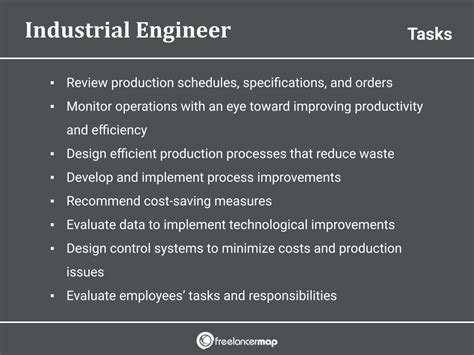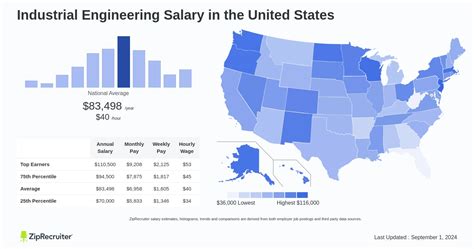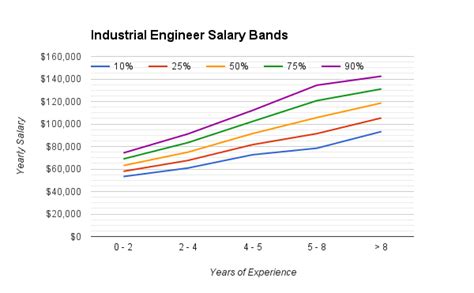Industrial Engineering stands at the unique intersection of engineering and business, offering a career path that is both intellectually stimulating and financially rewarding. For those with a knack for optimization, problem-solving, and systems thinking, it’s a field with immense potential. But what does that potential look like in terms of compensation?
This article provides a data-driven look into the salary you can expect as an industrial engineer. According to the U.S. Bureau of Labor Statistics, the median annual wage for industrial engineers was $99,920 in May 2023, with top earners exceeding $144,480. Let's break down what shapes these numbers and how you can maximize your own earning potential.
What Does an Industrial Engineer Do?

Before we dive into the numbers, it's essential to understand the value an industrial engineer brings to an organization. In short, industrial engineers are efficiency experts. They design, analyze, and improve integrated systems of people, money, knowledge, information, equipment, energy, and materials.
Their core mission is to eliminate wastefulness—of time, money, materials, and other resources. You can find them in nearly every industry, from manufacturing and aerospace to healthcare and finance, working on tasks like:
- Streamlining production lines to increase output.
- Optimizing global supply chains to reduce shipping costs.
- Improving patient flow in a hospital to reduce wait times.
- Designing ergonomic workstations to prevent worker injury.
- Implementing quality control standards to ensure product excellence.
Because their work directly impacts an organization's bottom line, skilled industrial engineers are highly valued and well-compensated.
Average Industrial Engineering Salary

While salary figures can vary, data from multiple authoritative sources provide a clear picture of the earning landscape for industrial engineers.
The U.S. Bureau of Labor Statistics (BLS) reports a median annual salary of $99,920 as of May 2023. This is the midpoint, meaning half of all industrial engineers earned more than this, and half earned less. The BLS data also shows a wide range:
- Lowest 10%: Earned less than $66,690
- Highest 10%: Earned more than $144,480
Leading salary aggregators provide a similar perspective:
- Salary.com reports that the typical salary range for an Industrial Engineer in the U.S. falls between $86,707 and $109,242, with an average base salary of around $97,298 (as of May 2024).
- Glassdoor, which incorporates user-submitted data, estimates a total pay (including base salary and additional compensation like bonuses) of approximately $104,792 per year (as of June 2024).
This data confirms that a six-figure salary is well within reach for most professionals in this field, especially as they gain experience.
Key Factors That Influence Salary

Your specific salary will be determined by a combination of factors. Understanding these variables is key to charting a high-earning career path.
###
Level of Education
A bachelor's degree in industrial engineering or a related engineering field is the standard entry point for the profession. However, advanced education can significantly boost your earning potential and open doors to specialized or leadership roles.
- Master's Degree (M.S. in Industrial Engineering, MBA): Pursuing a master's degree can lead to higher starting salaries and faster career progression. An M.S. deepens your technical expertise in areas like operations research or supply chain management. An MBA (Master of Business Administration) combined with an engineering undergraduate degree is a powerful combination for those aiming for high-level management and executive positions. Professionals with advanced degrees often command a 10-20% salary premium over their bachelor's-level peers.
- Certifications: Professional certifications demonstrate expertise and commitment. Certifications like a Lean Six Sigma Green or Black Belt, a Project Management Professional (PMP), or a Certified Supply Chain Professional (CSCP) can make you a more competitive candidate and justify a higher salary.
###
Years of Experience
Experience is one of the most significant drivers of salary growth in industrial engineering. As you move from theory to practical application, your value to an employer increases dramatically. Data from Payscale illustrates this progression clearly:
- Entry-Level (0-5 years): An early-career industrial engineer can expect an average total compensation of around $75,000. In this stage, you are learning to apply your academic knowledge to real-world problems.
- Mid-Career (5-10 years): With solid experience, the average salary climbs to approximately $97,000. At this point, you are likely managing projects, mentoring junior engineers, and taking on more complex challenges.
- Senior/Experienced (10+ years): A senior industrial engineer or engineering manager with a decade or more of experience can command an average salary of $115,000 or more, with many earning well into the $130,000-$150,000 range, particularly in management or specialized consulting roles.
###
Geographic Location
Where you work matters. Salaries often correspond with regional demand and the cost of living. According to the BLS (May 2023), the top-paying states for industrial engineers are:
1. California: $124,190 (Annual Mean Wage)
2. Washington: $118,520
3. New Mexico: $118,170
4. Texas: $114,640
5. New Jersey: $113,990
While these states offer higher salaries, it's important to weigh them against the higher cost of living in many of their metropolitan areas.
###
Company Type
The industry in which you work has a major impact on your salary. Industries with complex, high-stakes operations tend to pay more for efficiency experts. The BLS highlights several top-paying industries for industrial engineers:
- Oil and Gas Extraction: $140,540 (Annual Mean Wage)
- Aerospace Product and Parts Manufacturing: $119,770
- Semiconductor and Other Electronic Component Manufacturing: $117,040
- Scientific Research and Development Services: $114,840
- Federal Executive Branch: $112,980
Large, multinational corporations in sectors like technology, automotive, and consulting also typically offer more competitive compensation and benefits packages than smaller firms.
###
Area of Specialization
Industrial engineering is a broad field, and specializing in a high-demand area can significantly increase your salary. Some of the most lucrative specializations include:
- Supply Chain Management & Logistics: In today's global economy, professionals who can design and manage resilient, efficient supply chains are in extremely high demand.
- Operations Research & Data Analytics: Engineers who can apply advanced mathematical modeling and data science techniques to solve complex business problems are at the top of the pay scale.
- Quality Engineering & Six Sigma: Experts in quality control and process improvement methodologies like Lean Six Sigma are critical for manufacturing and service industries aiming for excellence.
- Healthcare Systems Engineering: Applying IE principles to improve efficiency, safety, and patient care in hospitals and healthcare networks is a rapidly growing and well-compensated field.
Job Outlook

The future for industrial engineers is bright. The U.S. Bureau of Labor Statistics projects that employment for industrial engineers will grow 12 percent from 2022 to 2032, which is much faster than the average for all occupations.
This strong growth is fueled by the universal need for organizations to increase efficiency, reduce costs, and improve quality in an increasingly competitive global market. As companies continue to invest in automation, data analytics, and supply chain resilience, the demand for industrial engineers who can design and manage these complex systems will only continue to rise.
Conclusion

A career in industrial engineering offers a stable, engaging, and financially rewarding path. With a median salary approaching six figures and significant growth potential, it is an excellent choice for analytical thinkers.
Key takeaways for maximizing your salary are:
- Build a Strong Foundation: A bachelor's degree is your starting point, but don't overlook the long-term value of a master's degree or professional certifications.
- Embrace Experience: Your earning potential will grow substantially with each year of experience. Focus on delivering measurable results in your roles.
- Be Strategic: Consider high-paying industries and geographic locations when planning your career moves.
- Specialize Wisely: Develop expertise in high-demand areas like supply chain management, data analytics, or healthcare systems to become an indispensable asset.
By strategically navigating these factors, you can build a highly successful and lucrative career as an industrial engineer.
